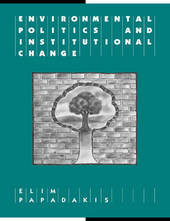
|
Environmental Politics and Institutional Change
Paperback / softback
Main Details
| Title |
Environmental Politics and Institutional Change
|
| Authors and Contributors |
By (author) Elim Papadakis
|
| Series | Reshaping Australian Institutions |
|---|
| Physical Properties |
| Format:Paperback / softback | | Pages:256 | | Dimensions(mm): Height 246,Width 189 |
|
| Category/Genre | The environment |
|---|
| ISBN/Barcode |
9780521556316
|
| Classifications | Dewey:333.7 |
|---|
| Audience | | Professional & Vocational | |
|---|
| Illustrations |
2 Line drawings, unspecified
|
|
Publishing Details |
| Publisher |
Cambridge University Press
|
| Imprint |
Cambridge University Press
|
| Publication Date |
18 November 1996 |
| Publication Country |
United Kingdom
|
Description
Environmentalism is one of the major issues of our time. A key question is how responsive are Australian institutions to the challenges posed by environmental issues? This book focuses on how effectively political institutions and organisations are able to address concerns about the deterioration of the environment. The book considers the key players in environmental debate and policy-making: social movements, interest groups, political parties, the media, the parliaments and the bureaucracy. It contains much rich empirical material. This stimulating and original book makes an important contribution not only to environmental politics, but to the ways in which institutions can become more effective and responsive to social forces. It will be of interest not only to political scientists and sociologists, but to environmental activists and policy-makers themselves.
Reviews."..the book will have something of interest to a large audience. This book will also be attractive to a broad audience because the Australian case study is complemented by examples drawn from a number of states....This book merits consideration....This book is an ideal text for advanced undergraduates, including those without great knowledge of India, or the history of science and technology. It is the kind of book which I, as a teacher, wish had been available twenty years ago. But beyond that, researchers in India will find something stimulating to agree or disagree with here." Robert S. Anderson, Pacific Affairs
|